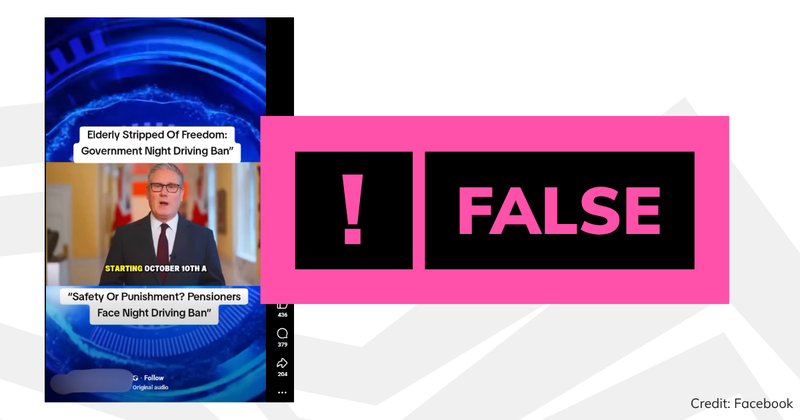Videos shared thousands of times on social media claim that from 10 October pensioners will be banned from driving at night, and could face a fine or lose their licence if they don’t comply.
The clips claim this new rule will be enforced from 10pm until 6am, and is being brought in as a safety measure.
But the Department for Transport confirmed these claims are false, and no such new rule is coming into force.
The clips have been shared over 2,000 times across Facebook and TikTok, with comments like “so how [are … pensioners] supposed to get home from work”, suggesting many people appear to believe the rule change is genuine.
While it may seem obvious to many people that it’s not real, it may not be to everyone, particularly more casual internet users. We’ve written more about this in our blog.
The videos also feature audio that sounds like the Prime Minister, Sir Keir Starmer. But there are clear signs that it is not genuine.
When Mr Starmer is shown speaking in a yellow corridor with two Union Jack flags behind him at the start of the Facebook clip, the audio does not match his lip movements, and the footage actually appears to be from an unrelated speech he gave on recognising a Palestinian state in September.
The clip at the start of the TikTok version, showing Mr Starmer in a wood panelled room, is also unrelated to driving rules changes, and appears to be from a speech he made on the humanitarian crisis in Gaza in July.
The cadence of the fake audio is also extremely even and the intonation sounds stiff and unnatural, which suggests it is AI-generated—although we can’t rule out it having been faked in another way, for example by using an impersonator. You can read more about how to spot AI audio, and the challenges of doing this, in our guide.
Driving rules for over 70s
There are already additional rules for drivers over the age of 70.
Once people reach the age of 70, they must renew their licence every three years.
In August, it was widely reported that the government is planning to make eye tests for the over 70s compulsory when they renew their licence. But there was no mention of any sort of curfew for older drivers.
Older driver statistics
The videos claim that the ‘new policy’ is in response to statistics that show older drivers face greater risks of accidents after dark.
The latest government figures show around a quarter of all car drivers killed in collisions in 2024 in Great Britain were older drivers (defined as those over the age of 70), with 11% of all casualties being in collisions involving older drivers.
Casualties from a collision involving at least one older car driver between 2020 and 2024 make up a much higher proportion of all killed or seriously injured (KSI) casualties during the day, specifically between 10am and 3pm. The report notes that the “proportion of casualties are very low in the early hours of the morning and late in the evening”.
Age UK advises older drivers that “driving at night can be more dangerous than driving during the day due to more limited visibility, dazzle from oncoming traffic, and simply feeling tired”, and advises drivers “think about whether there are any alternative transport options you could use”.
This is not the first time we’ve seen videos sharing misinformation about new policies or rules. For example, we’ve recently seen false claims that the government is introducing a £15 monthly ‘clean water levy’ for all UK households, and all dog and cat owners will have to pay a £100 annual fee from October.
A recent Full Fact investigation found at least 14 TikTok accounts had been involved in sharing such videos. After we contacted the social media platform, it told us that all 14 of the accounts we’d identified had been banned for breaching its rules, which do not allow “misinformation that could cause significant harm to individuals or society”. However, we’ve continued to see similar claims spread on social media via other accounts.
It’s important to consider whether information you see on social media comes from a trustworthy and verifiable source before sharing it. Our toolkit provides some advice about how to do this.
